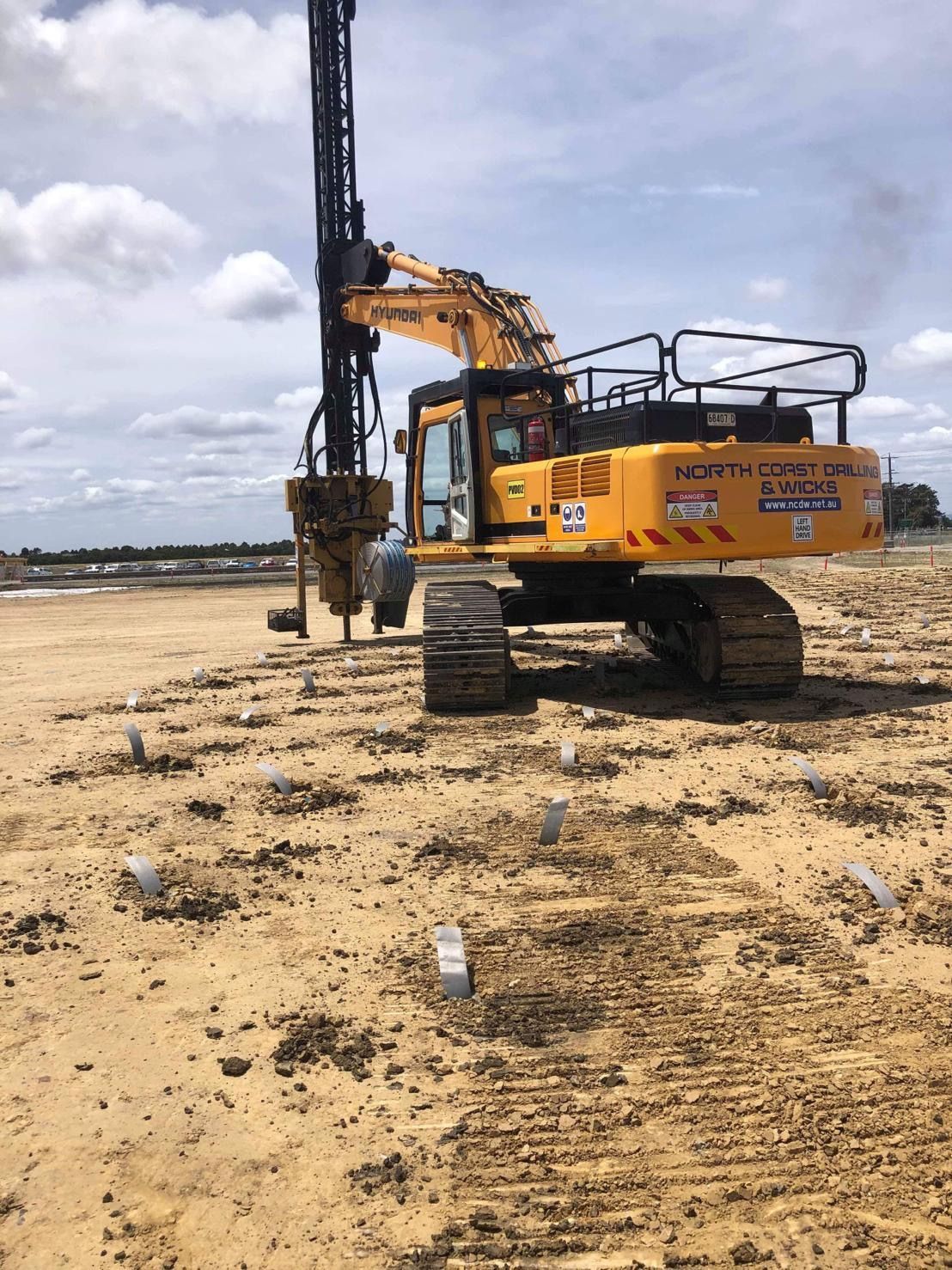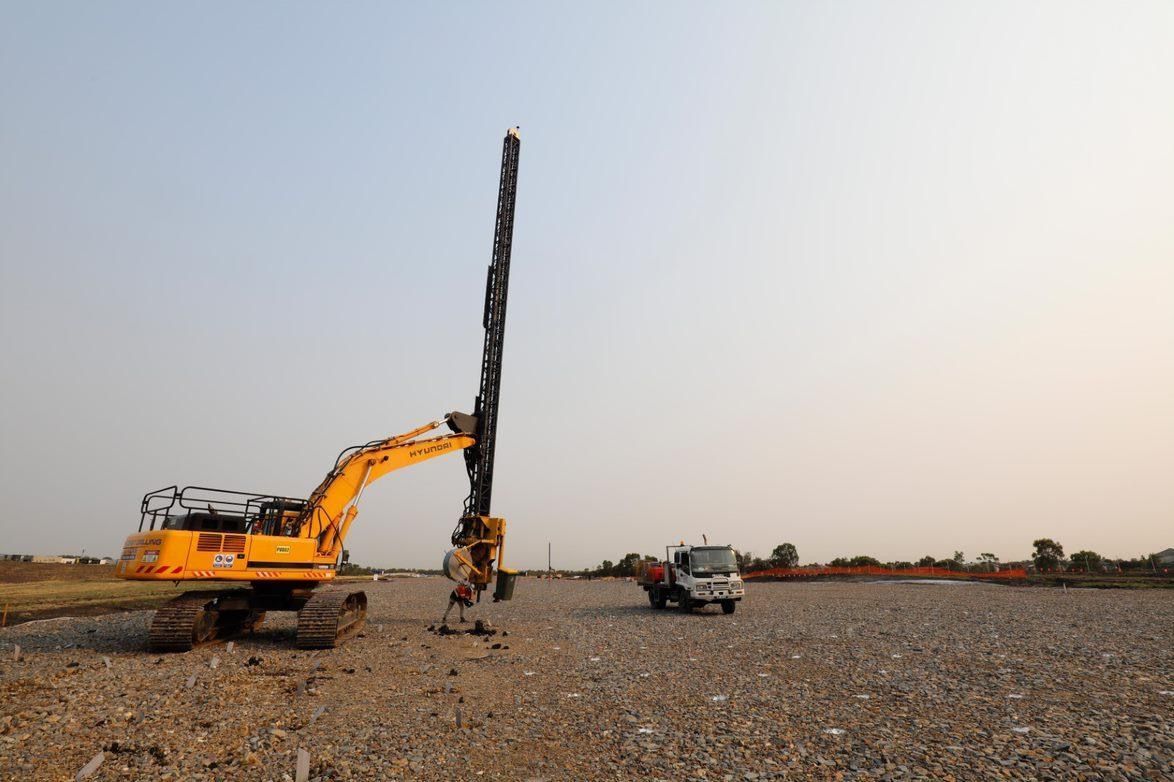Ground Improvement in
Australia
- Over 32 years of reliable, industry-backed drilling experience
- Full-service capabilities with 7 specialised drilling rigs
- Serving Australia with safe, efficient on-site delivery
Talk to the Team
Thank you for contacting North Coast Drilling & Wicks.
We will be in touch soon.
Oops, there was an error sending your message.
Please try again later.
Australia-Wide Ground Improvement
Unstable or saturated ground can stall progress and increase risk on any project. That’s why North Coast Drilling & Wicks delivers tailored ground improvement solutions across Australia, helping builders and civil contractors prepare sites for safe, long-term structural support.
Our work targets the root of soil instability—whether that’s moisture retention, compressibility or poor load-bearing capacity—and corrects it using proven, efficient methods.
Depending on your site conditions, we may recommend vertical wick drains, soil consolidation techniques, or a combination of drainage and reinforcement strategies. We also bring in specialist support services like geotechnical drilling, drilling rigs, and piezometer installation to fully assess and prepare the ground before work begins.
With more than 32 years in the field and seven rigs ready to go, our team will ensure your site is safe, compliant and construction-ready. To speak with a ground improvement specialist, call
0401 380 986 today.
Stabilise Soil & Build with Confidence
Every successful project starts with solid ground. Our ground improvement services are designed to correct problem soils and reduce the risk of long-term movement or failure. Whether you're dealing with deep soft clays, reclaimed land or a high water table, we provide practical, engineered solutions to improve soil behaviour and bearing capacity.
Our team works closely with project engineers to design and implement methods that suit each specific site.
- Strengthens soil for structural support
- Reduces settlement & water retention
- Prepares sites for fast, compliant construction
We know how important timing and safety are on large-scale builds. That’s why our methods are efficient, cost-effective and tailored to your scope.
Reach out today to discuss your site conditions or request a quote for ground improvement services.
Frequently Asked Questions
What is ground improvement?
Ground improvement refers to techniques used to enhance the physical properties of soil to meet specific engineering requirements. This process increases the soil’s load-bearing capacity, stability and drainage characteristics, allowing it to support structures safely. Methods include compaction, vibro stone columns, grouting, soil mixing, wick drains, preloading and dynamic compaction. Ground improvement is essential in areas with soft, loose or otherwise problematic soils, enabling construction that would otherwise be risky or unfeasible. It is widely applied in infrastructure projects like highways, railways, embankments, ports and building foundations, ensuring long-term performance and minimising settlement or structural failures caused by poor soil conditions.
What types of soils benefit most from ground improvement?
Ground improvement is particularly effective in weak or problematic soils, including soft clays, silts, loose sands, peats and organic soils. These soils typically have low shear strength, high compressibility and poor drainage characteristics, making them unsuitable for construction without treatment. By improving soil density, strength and drainage capacity, ground improvement allows for safe and reliable foundations. Conversely, well-graded gravels and dense sands usually require little to no ground improvement, as they naturally exhibit good load-bearing properties. A thorough geotechnical investigation is essential to determine the suitability of the soil and select the most effective ground improvement method for the project.
What are the main ground improvement methods?
Several ground improvement methods are available, each suited to specific soil conditions and project goals. Common techniques include vibro compaction for densifying granular soils, vibro stone columns and sand compaction piles for reinforcing soft ground, and dynamic compaction for loose fills. For cohesive soils, methods like prefabricated vertical drains (PVDs) combined with preloading, deep soil mixing and grouting are used. Jet grouting and chemical stabilisation also offer targeted solutions for improving soil properties. The choice of method depends on factors like soil type, depth of improvement needed, environmental impact, project scale and construction timeline, ensuring optimal ground performance.
How do you ensure safety on remote or interstate sites?
Safety is central to everything we do. Before mobilising, we conduct risk assessments, provide comprehensive inductions, and ensure all equipment is maintained to the highest standards. Our crews follow strict safety protocols, so projects are carried out securely and efficiently in any environment.






